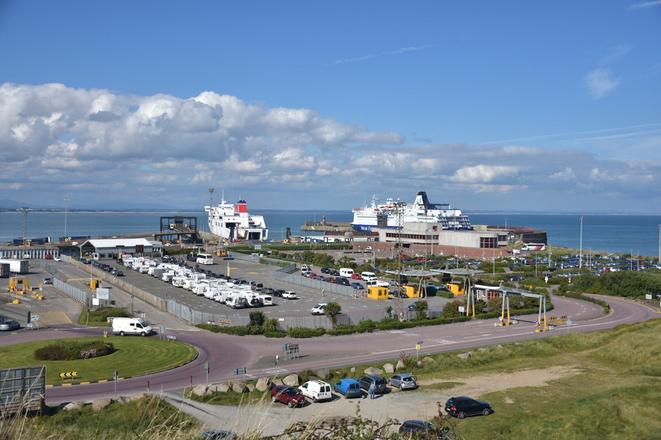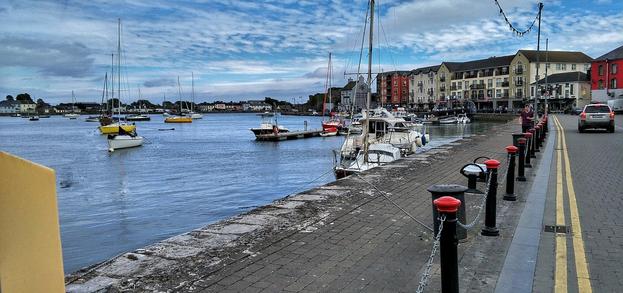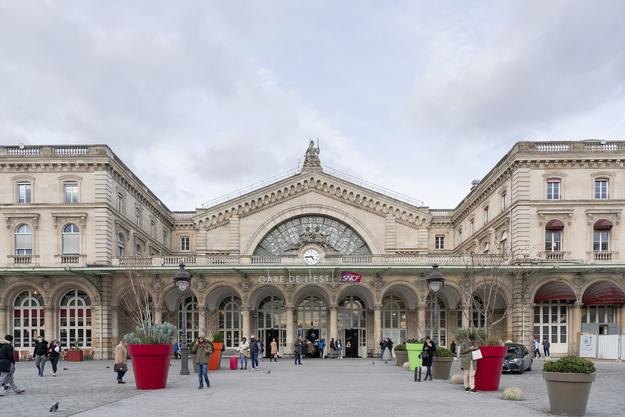Sometimes, if you make yourself suffer, you might just learn a thing or two. So I decided to travel overland from my hometown in the southwest of Ireland—Ballyheigue, County Kerry—to my home in Bratislava. As the crow flies, that’s roughly 2,000 kilometres. I would favour hitch-hiking, but in general I wouldn't shy away from other means of transit. My friends called me crazy and asked if I needed money for a plane ticket. Money wasn't the issue. Simply spending eight years going back and forth between Ballyheigue and Bratislava the exact same route had grown boring: bus/plane/bus. Why not car/train/boat/car/car/train/bus?
Day one started slow. I stood outside the capital of County Kerry, Tralee, nestled underneath the Sliabh Mish mountains, for about an hour before someone stopped for me—a lovely middle-aged man who went out of his way for me and who had, in fact, been to Bratislava before. Another two hours in Farranfore, home of Kerry Airport, which is is so small it makes Bratislava Airport look like Heathrow. Still, as I waited two hours holding a sign saying “Bratislava”, it was tantalising to think of dropping the whole escapade there and hopping on a flight to Dublin or Frankfurt.
Luckily, a building site surveyor stopped for me. Guys like this were the whole reason I went hitching. As he drove me the hundred kilometres to Cork, he went deeper and deeper into his layers of conspiracy about what was really going on. The royal families of the world still controlled everything. Cars were going to be made illegal. Once They replace cash with cryptocurrency, he’s moving to the mountains to grow his own food. It was like my own personal Joe Rogan podcast. This man said of my plan to travel overland to Slovakia reminded him of Forrest Gump: “Mamma always said life was like a box of chocolates.”
A Czech man named Blondík from Ústí nad Labem, Czechia, drove me from Midleton to Dungarvan. This ride pushed my command of the Slovak language to its absolute limits, but I managed to communicate with him pretty effectively without speaking English for over an hour. He did not seem impressed or weirded out that a random Irish guy he picked up on the side of the road was able to speak Slovak. Maybe it’s more common than I think.
We barreled past the rolling green hills and gentle coastline of Southeast Ireland, listening to Czech hardcore punk while comparing notes on the punk scene in Ireland, Czechia, and Slovakia.
I made it across Ireland in six drives and eight hours—350 kilometers down. I enjoyed a pint of Guinness and a Spice Bag in Wexford town before getting a train to the ferry in Rosslare Harbour. A Spice Bag, in case you don’t know, is a creation of Irish Chinese restaurants—a bag of fries, spicy fried chicken, and vegetables. It’s both disgusting and delicious.
At €90 for a 600-kilometre journey, the ferry was pretty good value. You aren’t getting a cabin for that money, though, oh no. You’re sleeping in the restaurant, and the staff are going to vacuum around you. You’re going to sleep wearing sunglasses because there’s no way they’re turning the lights off. One guy I saw looked like a professional ferry traveler. He had set up camp underneath a set of stairs and was wrapped up like a mummy for over 12 hours. This is a form of time travel.
You can tell the economies of Ireland and France are different by comparing Rosslare and Cherbourg. Cherbourg has a massive decommissioned nuclear submarine in a permanent dry dock, seemingly just for fun. Rosslare does not have this. I did not have time to explore this submarine, though, as I had again cheated on hitching by booking a BlaBlaCar to Paris. BlaBlaCar is a purified form of Uber—literal ride-sharing, not just a taxi company by another name. I have used it a handful of times to go to Prague and back from Bratislava, but it is nowhere as popular in Central Europe as it is in France. Every major city has multiple drives offered at regular intervals at pretty good prices.
I had told myself the day before that I would not go to Paris. I woke up that morning and decided I would go to Paris. When would I next be near the Olympics? In fact, the city was not that busy. I only saw a few Olympic heads in the thin sliver of Paris I experienced. A friend recommended a bar to me, but it was too stuffy, so I went to the nearest Irish bar I could find, to make up for all the Guinness I didn’t drink in Ireland. I made some friends there, with a group of Californians and a Chicagoan. The Chicagoan initially seemed like a boring guy, working in the obscure world of Credit Default Swaps (the financial instruments that caused the 2007 banking crisis). Then, this bald white guy in glasses told me he was not only Eskimo brothers (meaning they shared a common romantic partner) with Kanye West, but also that due to his upbringing in South Chicago, he was more Black than any of the African people living in Paris. I have no idea what he meant by this, and I didn’t ask. I prefer the mystery.
The next day, hungover, I went to my first hitchhiking spot. The website Hitchwiki—which is a repository of hitchhiking information, tips, and tricks—advised that I could hitch within Paris itself from one particular spot leading to the A4 motorway. After spending an hour in the direct sunlight on a very busy road leading to the main Olympic stadium, breathing in petrol fumes and slightly concerned I might get hit by a bus, I decided I had to leave Paris proper. A train journey later, I was out near Disneyland, standing on a roundabout leading to the A4, with bemused pedestrians asking where I was going. In short order, I had a lift from a Frenchman who took me the two kilometres I desired to the nearest petrol station on the motorway.
This guy did not speak a lick of English, and I passed my final French exam in school with 46 percent. I have been so comfortable being able to communicate with basically everyone I’ve met for the last few years that I forgot what the language barrier felt like.
In the petrol station, I saw something very, very interesting: a truck with a Slovak license plate. The driver was sitting in the cab, window open. As I walked over to the truck with a friendly, “Kámo, nejdeš do Bratislavy?” (Man, aren’t you heading back to Bratislava?), he drew the curtain around him and did not answer. Kámo was not going to Bratislava. Maybe he was Hungarian.
A friendly but Francophone couple picked me up not long after this, but because of the language barrier, I didn’t catch where they were actually going until it was too late. They were only going to Meaux, a short distance outside Paris. They offered to leave me on the motorway or take me into the town. I value not being flattened by an articulated lorry, so I took the ride into town. At this stage, it was 17:00, and I had made it only 30 kilometres outside of Paris. My goal was to be in Metz by nightfall so the next day I could begin crossing Germany. I got weather alerts for thunderstorms on my phone. I had gotten my fill of thunderstorms at Slovakia’s Pohoda festival a few weeks previously. I searched my heart for how I wanted to proceed. Go back to Paris? Stay another night? How exactly would I get back to Bratislava, and how long would it take me? I wanted to be in my own bed. I wanted to be in my bar. Fly to Vienna for €300, fly to Budapest for €500? Spend three days trying to get through Germany?
In the end, I got the train back to Paris, to Gare de l’Est. This was approximately 400 metres from my hostel, where I had begun my journey that day. Talk about demoralising. Whatever, I thought, I’m taking the bullet train. Frankfurt was sold out, so I opted for Strasbourg. East, east, east. Five hundred kilometres blew by in just two hours, as I watched lightning bolts from the window. Better in than out. I spent an idyllic four hours walking around the home of the European Parliament. And at this stage, I was thoroughly done with my holiday, so I settled in to cross the final barrier: a 12-hour FlixBus ride to Vienna. This was purgatory, plain and simple—my punishment for living an unjust life, but not quite bad enough that I’d be sent to hell. Twelve hours, half asleep, half awake, the reek of piss from the bathroom fondling my non-consenting nose.
Crossing back into Slovakia felt like putting on a warm pair of socks on a winter morning. Emerging from the train station in Petržalka, one of Bratislava’s boroughs, was a very different experience from Strasbourg or Paris, but the towers of the aspirationally named Vienna Gate, a brown glass business centre and apartment building, were still a welcome sight.
This trip was a real eye-opener for me. I saw in real terms just how long 2,000 kilometres is.
It’s long. If I were to do this again, I’d probably focus on speed. I’d have avoided Paris completely and gone directly to the nearest motorway on-ramp from the ferry, trying to push through Belgium into Germany—a sort of reverse 1940 maneuver. I would have been more discerning about who I actually caught a ride with, too. And I definitely need to figure out the logistics of hitching on the motorway.
I think it is a special achievement to spend 24 hours in Paris and not see a single tourist attraction, especially on a trip that was ostensibly touristic.
But would I do it again? Should you do it? Hitching through Ireland was a lot of fun. I would recommend that to anyone. It’s a great way to meet people. For shorter journeys, it’s definitely the best. I could see myself going around Slovakia in this way. But my advice is, if you want to travel from Ireland to Slovakia, take the aeroplane.




